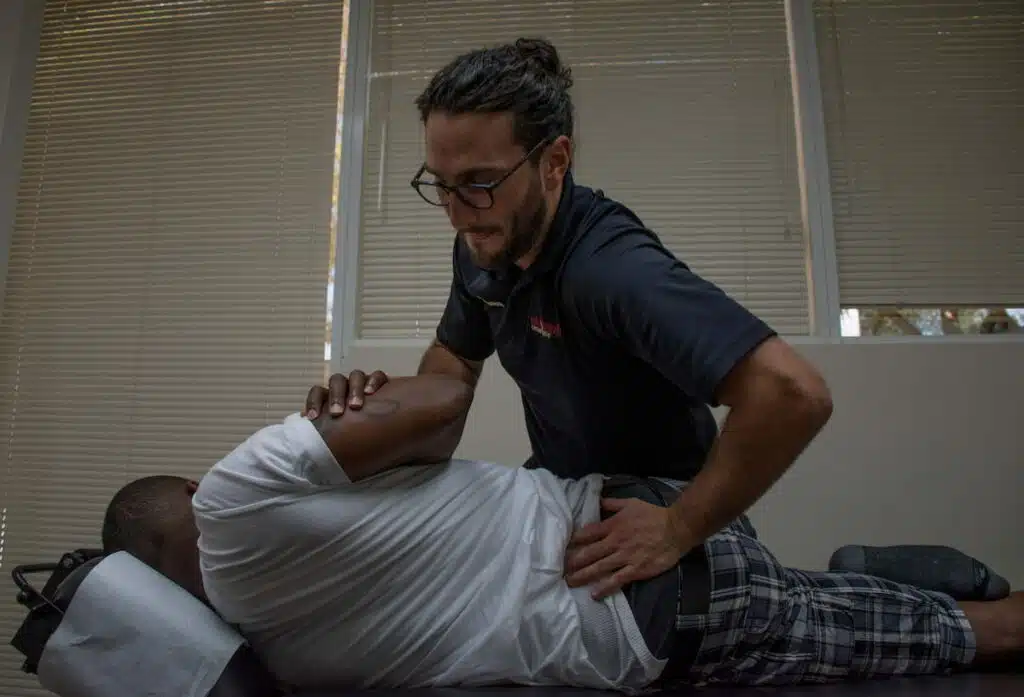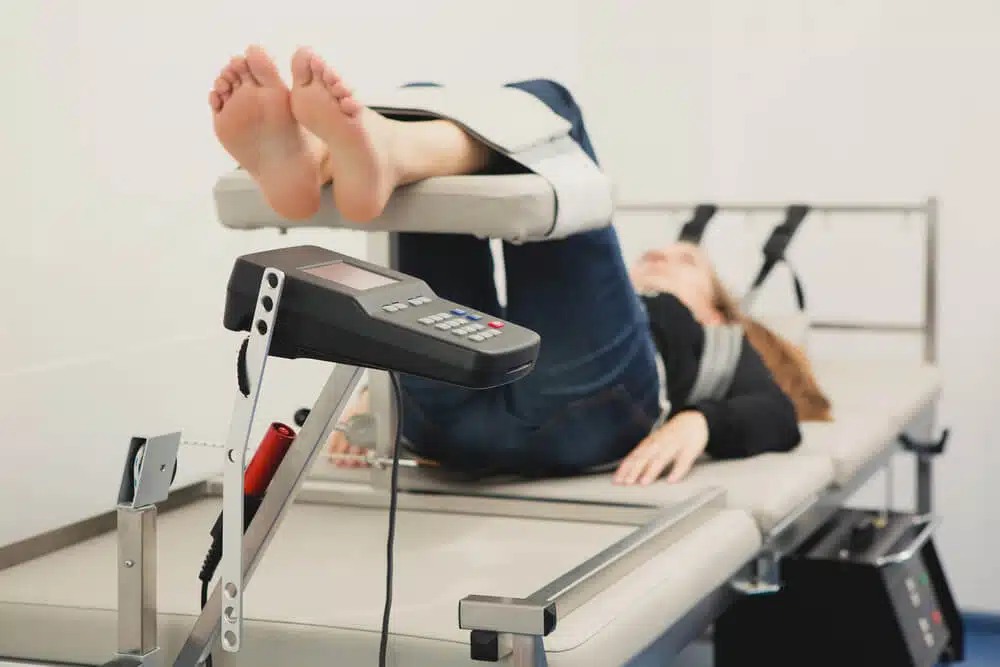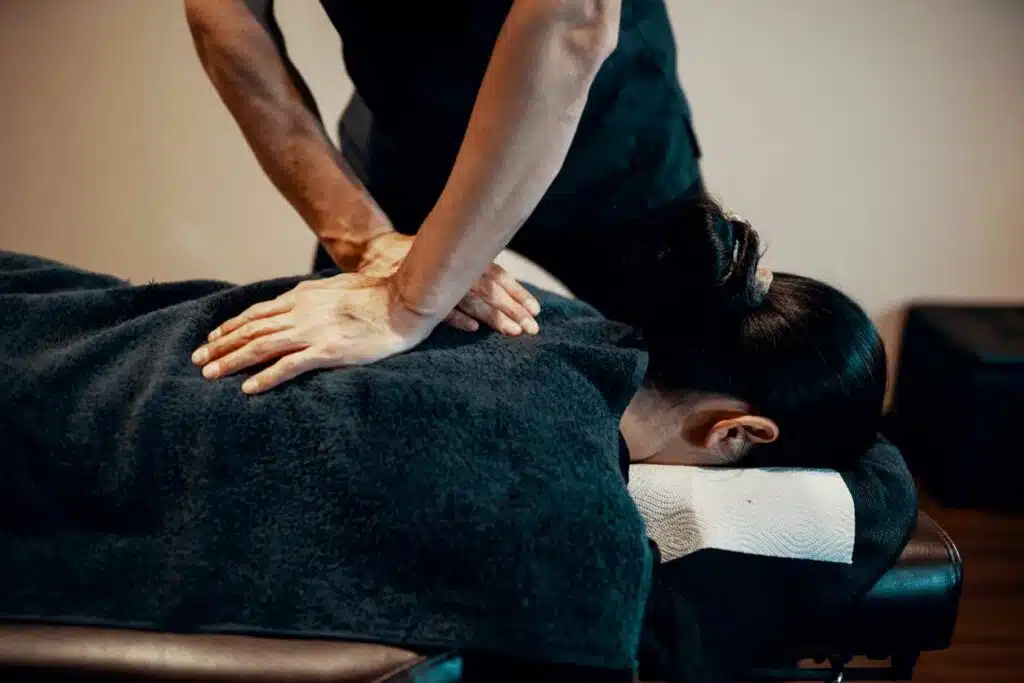Have you ever considered how a minor car accident can sometimes lead to a painful herniated disc? It’s a pretty common issue after a car collision. The sudden impact can stress your spine, causing pain and limited mobility. Most people would think of treatment methods like surgery for an injury like this.
But what if there was a way to ease it without surgery?
Enter spinal decompression. It’s a practical, non-surgical method for treating pain from herniated discs. This treatment stretches your spine to relieve pressure on the discs, easing your spin and improving your mobility. In this blog, we’ll discuss the benefits of spinal decompression for herniated discs from car accidents.

A herniated disc, also called slipped, ruptured, or bulging disc, happens when one of the soft, cushiony discs between your spine’s bones gets damaged and protrudes out of place. This swelling presses on nearby nerves, causing pain, numbness, or weakness in the affected area. The disc’s tough outer layer cracks, allowing the soft, gel-like center to escape.
While herniated discs from car accidents are rare, they can still occur. The sudden impact from a crash can push, strain, crack, or twist your spine, potentially harming the discs. If you have existing or previous spine issues, you are more likely to develop a herniated disc more easily.
The symptoms of a herniated disc can vary depending on its location in your spine. Common signs include the following:
If you think you have a herniated disc, seek medical attention immediately to prevent severe and long-term complications. It would be best to address it promptly, as waiting can only worsen your symptoms and lead to chronic pain.

Spinal decompression therapy is a non-surgical treatment characterized by gently and slowly stretching the spine to release pressure on the discs and nerves. Typically, you lie on a specialized table designed for this procedure.
Spinal decompression can be particularly effective at treating herniated discs. The stretching creates a vacuum inside the discs, pulling a bulging or herniated disc back into place. As the pressure inside the discs drops by creating negative pressure, essential nutrients and oxygen flow back in, easing pain and helping the disc heal naturally. Best of all, this procedure avoids unnecessary surgery.
Spinal decompression serves as an effective herniated disc treatment that provides non-surgical disc relief. This therapy provides a safer and more comfortable option by avoiding the risks associated with surgery, such as infections, complications, and scarring. It also eliminates the need for potentially addictive pain medications, offering a drug-free treatment.
Spinal decompression eases pain by reducing pressure on your affected nerves and healing your herniated disc. This non-surgical treatment can significantly enhance your quality of life and daily function. You might notice improved mobility, allowing you to perform daily activities without discomfort.
Spinal decompression enhances blood flow and nutrient exchange to the damaged disc, supporting the body’s natural healing ability. It accelerates recovery and reduces the likelihood of recurring injuries, helping the body heal more efficiently and effectively.
Spinal decompression is often part of a chiropractic care plan that includes exercises and lifestyle changes to help keep you healthy and active. Committing to regular sessions can help you achieve long-term relief from herniated discs and prevent future problems.
Spinal decompression can treat various spinal conditions. For instance, it may benefit individuals with herniated discs, degenerative disc disease, sciatica, or chronic back pain. It can ease pain, reduce inflammation, and promote healing, which helps improve mobility and overall quality of life.

Talk to a chiropractor before you begin spinal decompression. This is especially important if you have other health issues or spinal problems. Chiropractors can help determine if this is the right treatment for your herniated disc.
Remember, you should only undergo this therapy under the guidance of a qualified professional. They’ll ensure the treatment is safe, effective, and, most importantly, tailored to your needs. This way, you can maximize the benefits and minimize any potential risks.
During your first visit, you’ll undergo a thorough assessment to determine the intensity of your herniated disc and any related issues. Your chiropractor will conduct a physical evaluation, review your medical history, and order X-rays and MRIs.
Using these findings, your chiropractor will create personalized treatment plans tailored to your needs. Discuss this plan to ensure you understand each step and know what to expect as you proceed with your therapy.
Spinal decompression therapy sessions usually last between 30 to 45 minutes and occur at a set frequency. Your chiropractor will guide you through each session to ensure top performance.
During regular follow-up visits, your chiropractor will monitor your progress and adjust the treatment accordingly. These visits ensure that you stay on track and continue making progress toward optimal recovery.
Spinal decompression offers essential benefits for those recovering from herniated discs caused by car accidents. It reduces pain, encourages natural healing, and avoids long-term issues. By easing pressure on your spinal discs, this therapy helps you recover more quickly without needing medication or surgery. With expert chiropractic care and spinal decompression, you can fully recover and reclaim your quality of life.
Discover how the benefits of spinal decompression for herniated discs can enhance your recovery at Stumpff Chiropractic. Our chiropractic care and other non-surgical disc relief treatments will address your herniated discs and other related injuries to help you lead a comfortable and pain-free life.
Contact us today!
